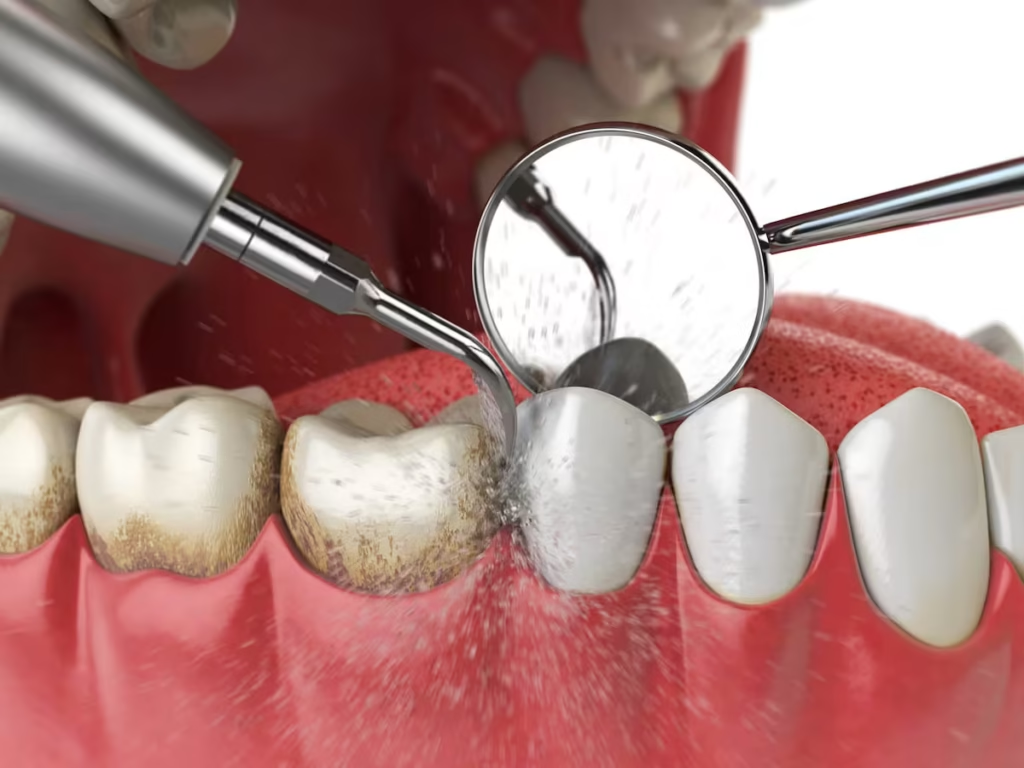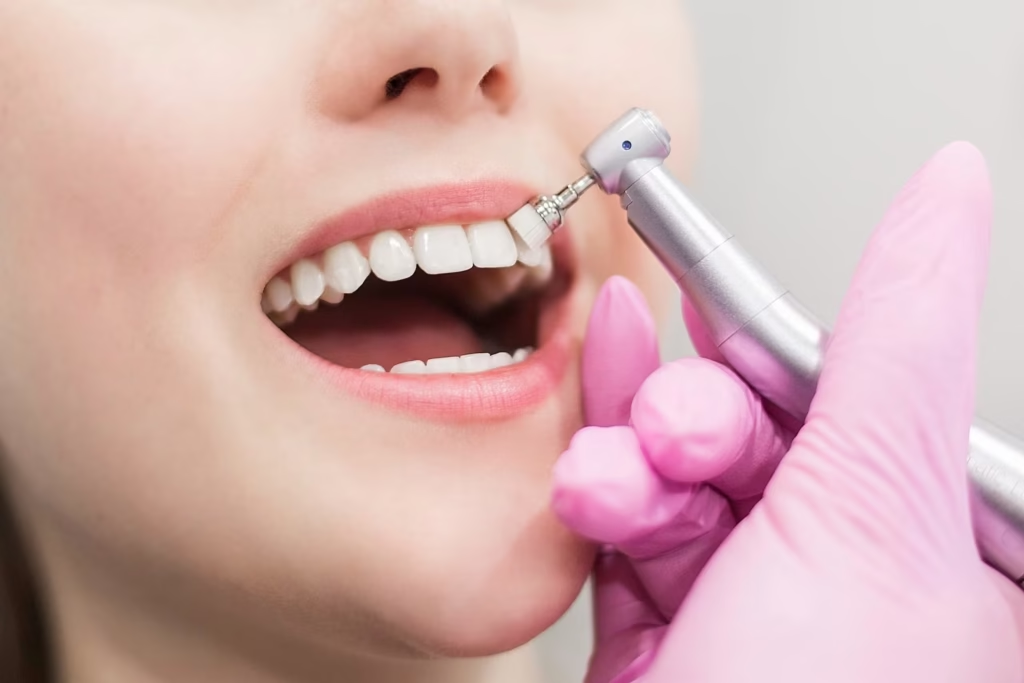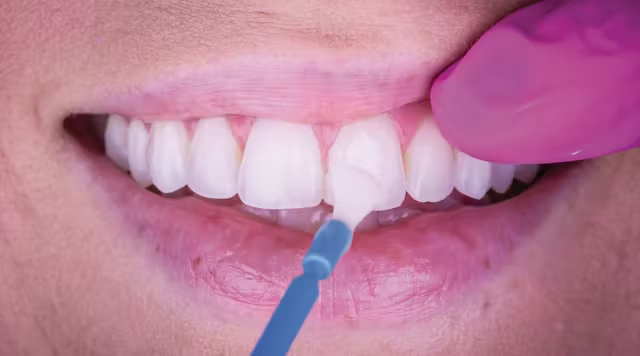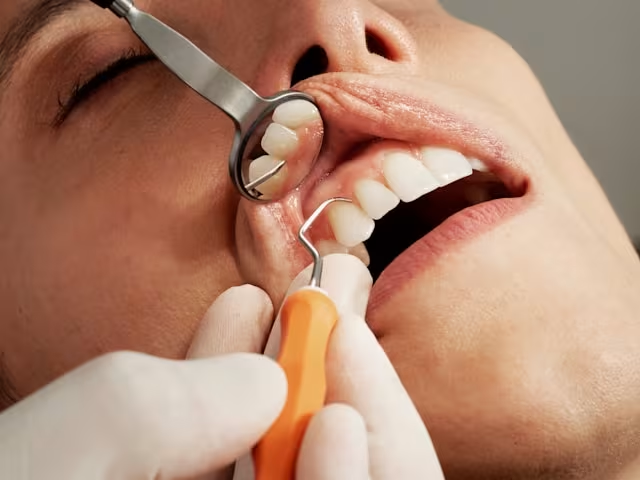Maintaining optimal oral health requires more than just daily brushing and flossing.
Professional dental cleaning procedures like scaling and polishing play a crucial role in preserving your dental wellbeing.
This comprehensive guide covers everything you need Scaling and Polishing in Singapore: The Complete Guide to Dental Cleaning
What is Scaling and Polishing?
Scaling and polishing are essential components of professional dental cleaning that help maintain optimal oral hygiene and dental health.
Despite diligent daily brushing and flossing, plaque and tartar can still accumulate on your teeth, potentially leading to various dental issues if left untreated.
Scaling and polishing procedures effectively remove stains, plaque, and tartar that are unreachable through regular brushing.
This professional dental service is widely available across Singapore and forms a critical part of preventative dental care.
This might help: Which Dental Clinic in Singapore Should You Consider? (Sort by Reviews)
The Scaling Process

Scaling is the process where dentists or oral hygienists use specialized dental instruments to loosen and remove plaque and tartar (calculus) from your teeth surfaces and below the gum line.
Plaque is a soft, sticky, colorless or pale-yellow film of bacteria that naturally forms on teeth over time.
When bacteria combine with food particles on your teeth, plaque develops. If not removed through regular brushing, this plaque eventually hardens into tartar, which typically appears yellow or brown and cannot be removed by normal brushing.
Related article: The Complete Guide to Protruding Teeth: Causes, Complications and Treatment Options
Dental scaling can be performed using:
- Hand-held instruments: The dentist uses a dental scaler and curette to manually remove plaque and tartar from the tooth.
- Ultrasonic instruments: A vibrating metal tip chips off the tartar while a water spray washes it away and keeps the tip cool.
The Polishing Process

After scaling, polishing is performed to smooth the tooth surface and remove light stains.
This is done using a soft rubber cup and gritty paste applied in a circular motion. The polishing process:
- Removes surface stains caused by coffee, tea, smoking, or other substances
- Makes teeth look smoother, cleaner, and brighter
- Creates a smooth surface that makes it more difficult for new plaque to adhere
- Completes the cleaning process by eliminating remaining bacteria
For severe staining, some dental clinics use a stronger stain remover tool known as “Prophyjet” to effectively blast away stubborn stains.
Finally, fluoride is often applied to protect your teeth and strengthen the enamel.
Read more: Teeth Whitening in Singapore
The Scaling and Polishing Procedure
A typical scaling and polishing session in Singapore involves the following steps:
Step 1: Consultation
Your visit begins with a consultation where the dentist examines and evaluates your dental health.
This assessment helps determine the extent of cleaning required and identifies any potential dental issues that might need attention.
Step 2: Scaling
During this step:
- The dentist removes plaque and tartar from your teeth and gums using hand-held and/or ultrasonic instruments
- You’ll need to rinse your mouth occasionally to expel the removed plaque or tartar
- The dentist will pay special attention to areas where tartar tends to accumulate, such as along the gum line and between teeth
You might like: Smile Makeovers in Singapore: Costs, Procedures, and Benefits
Step 3: Polishing
After scaling:
- Your dentist polishes your teeth using a soft rubber cup and special polishing paste applied in a circular motion
- This helps smooth the surfaces and remove light stains
- The process makes your teeth feel smoother and look cleaner
- Some clinics may use air-powder polishing systems for more effective stain removal
Step 4: Fluoride Application

Many dentists complete the treatment by applying fluoride to:
- Protect your teeth against decay
- Strengthen the tooth enamel
- Increase your teeth’s resistance to acid attacks from oral bacteria
It’s important to note that teeth discoloration or stubborn stains cannot always be completely removed by polishing.
In such cases, your dentist may recommend other dental procedures such as teeth whitening depending on your condition.
This might help: Complete Guide to Fixing a Gummy Smile: Causes and Treatment Options
Scaling and Polishing Price in Singapore
The cost of scaling and polishing in Singapore typically ranges from S$80 to S$150, depending on several factors:
- The condition of your teeth
- The amount of time required for cleaning
- Whether a second visit is required for further cleaning
- The clinic’s location (neighborhood and heartland clinics often charge lower fees due to lower rental costs)
- Whether the procedure is performed by a dentist or an oral hygienist
Subsidies for Scaling and Polishing
Singapore residents may be eligible for subsidies for dental services such as scaling and polishing.
The available subsidies and claimable amounts per year include:
- CHAS Blue card: $50.50
- Merdeka Generation card: $60.50
- Pioneer Generation card: $70.50
These subsidies help make dental care more accessible and affordable for eligible Singaporeans, encouraging regular dental check-ups and preventative care.
Read more: The Ultimate Guide To Seeing A Dentist In Singapore
Benefits of Scaling and Polishing
Regular scaling and polishing offers numerous benefits for your oral and overall health:
Eliminate Plaque and Tartar
When bacteria bind with food particles on your teeth, plaque forms. Over time, this plaque hardens into tartar, which cannot be removed by regular brushing.
Scaling and polishing effectively removes these substances, preventing enamel and root damage.
Prevent Gum Disease
By removing plaque and tartar from accumulating on your gums, scaling and polishing significantly reduces the risk of gum disease.
The early stage of gum disease, known as gingivitis, is characterized by inflamed, red, and easily bleeding gums.
If left untreated, gingivitis can progress to a more severe form called periodontitis, where damage occurs to the inner layer of the gums, causing bone to recede from the teeth and forming small pockets.
These pockets deepen over time, leading to more tissue and bone destruction and eventually loose teeth.
Regular professional cleaning can help prevent these issues and subsequently reduce the risk of other health conditions linked to gum disease, such as diabetes and heart disease.
Related article: White Spots On Teeth: Causes, Treatments, and Prevention
Prevent Tooth Decay
Removing plaque and tartar from your teeth helps prevent tooth decay. The bacteria in plaque produce acids that attack tooth enamel, leading to cavities.
Regular professional cleaning interrupts this process.
In the long run, this preventative care can save money on other dental treatments such as fillings, extractions, and even dental implants.
Improve the Appearance of Your Teeth
By removing surface stains caused by coffee, tea, or smoking, scaling and polishing can make your teeth look smoother, cleaner, and brighter.
While this is not a teeth whitening treatment, it can significantly enhance your smile’s appearance.
Eliminate Bad Breath
Bacteria found in your mouth are a primary cause of bad breath (halitosis).
By cleaning your teeth thoroughly and removing any signs of tartar, scaling and polishing can help eliminate bad breath, allowing you to speak more confidently.
Early Detection of Dental Issues
Regular scaling and polishing sessions provide an opportunity for your dentist to examine your oral health and detect potential issues early.
Early intervention for problems like cavities or gum disease prevents more complicated treatments later.
Differences Between Dentists and Oral Hygienists
Both dentists and oral hygienists are trained in providing scaling and polishing services, but there are important differences between them:
Dentists are recognized as professional doctors who are skilled in all areas of dentistry. They focus on diagnosing and creating treatment plans for patients.
Oral Hygienists are licensed professionals who mainly provide preventive dental care and services related to oral hygiene. They often specialize in scaling and polishing procedures.
At many dental clinics in Singapore, both dentists and oral hygienists are proficient in scaling and polishing.
Notably, oral hygienists often excel in these procedures due to their specialized focus and can sometimes offer these services at more affordable rates.
For first-time visitors to a dental clinic, the initial appointment will typically be with a dentist.
Subsequently, patients may opt for an oral hygienist for future routine cleaning appointments.
Maintaining Oral Health Between Professional Cleanings
To maintain your oral health and hygiene between professional scaling and polishing sessions, it’s important to adopt the following habits:
- Brush your teeth at least twice a day (ideally after every meal) for two minutes each session
- Use fluoride toothpaste and a soft-bristled toothbrush
- Floss at least once daily to remove food particles and plaque between teeth
- Consider using an antiseptic mouthwash to reduce bacteria
- Limit consumption of sugary foods and beverages
- Avoid smoking or using tobacco products, which contribute to staining and plaque buildup
- Stay hydrated, as a dry mouth can increase bacterial growth
- Visit the dentist for scaling and polishing every six to twelve months, or as recommended by your dentist
Common Misconceptions About Scaling and Polishing
“Scaling and Polishing Damages Teeth”
This is false. When performed by qualified professionals, scaling and polishing is not harmful to your teeth.
The procedure only removes accumulated plaque and tartar without affecting the tooth surface.
It’s a crucial part of maintaining good oral health when done according to a dentist’s recommended schedule.
“Scaling and Polishing is the Same as Teeth Whitening”
While scaling and polishing can remove surface stains and make teeth appear brighter, it is not the same as teeth whitening.
Teeth whitening is a cosmetic procedure that involves bleaching the teeth to achieve a whiter shade, while scaling and polishing is primarily a preventative and hygienic procedure that removes plaque and tartar.
“Scaling is Unnecessary If You Brush Regularly”
Even with meticulous brushing and flossing, some areas of the mouth are difficult to clean thoroughly, allowing plaque to accumulate and harden into tartar. Professional scaling is necessary to remove this buildup and maintain optimal oral health.
FAQ
How often should I get scaling and polishing done?
It is generally recommended to visit the dentist for scaling and polishing every 6 to 12 months.
However, this can vary based on your individual oral health needs.
After treatment, your dentist will advise on the appropriate interval for your follow-up appointment, depending on your dental health condition.
Is scaling and polishing painful?
Regular scaling and polishing typically involves minimal discomfort and is often painless for most individuals.
However, discomfort may occur if there is stubborn or deep-set tartar, sore gums, or exposed sensitive areas on the teeth.
If you have extremely sensitive teeth or are concerned about pain, inform your dentist beforehand.
Local anesthesia or numbing cream can be provided if needed to ensure a comfortable experience.
How long does a scaling and polishing procedure take?
On average, scaling and polishing takes approximately 30-40 minutes. The duration may be slightly longer if you have more stains or a significant buildup of tartar that requires additional time for thorough cleaning.
What is the difference between plaque and tartar?
Plaque is a soft, sticky, colorless or pale-yellow film of bacteria that forms on your teeth, which can be removed by regular brushing and flossing. If plaque remains on teeth for too long, it hardens into tartar (also called calculus), which is usually darker in color (yellow or brown) and can only be removed with professional dental tools during scaling and polishing.
Does scaling and polishing whiten teeth?
Scaling and polishing can help make your teeth look cleaner and brighter by removing surface stains caused by coffee, tea, and smoking.
However, this is not a teeth whitening treatment.
If you wish to improve the shade of your teeth significantly, you may need to opt for cosmetic teeth whitening, which bleaches the structure of your teeth to achieve a whiter tooth shade.
Can scaling and polishing damage my teeth?
No, when performed by qualified professionals, scaling and polishing does not damage your teeth.
The procedure only aims to remove accumulated plaque and tartar without affecting the tooth surface.
However, it’s important not to seek scaling more frequently than recommended by your dentist, as over-cleaning might eventually lead to enamel wear.
What are the signs that I need scaling and polishing?
Signs that indicate you may need professional cleaning include:
- Visible tartar buildup (yellowish or brownish deposits) along the gum line
- Persistent bad breath despite regular brushing
- Bleeding gums when brushing or flossing
- Red, swollen, or tender gums
- Receding gums
- Loose teeth
- A change in how your teeth fit together when biting
What should I do if my gums bleed during brushing?
Bleeding gums are often a sign of gum inflammation (gingivitis or periodontitis).
Continue brushing and flossing gently, as good oral hygiene can help reverse early gum disease.
However, you should also visit your dentist promptly for proper evaluation and treatment, which may include professional scaling and polishing to remove the plaque and tartar causing the inflammation.
What is fluoride treatment, and why is it often done after scaling and polishing?
Fluoride is an important mineral that helps prevent tooth decay by making the tooth more resistant to acid attacks from bacteria and sugars in the mouth.
Fluoride treatments performed after scaling and polishing help strengthen the tooth enamel and restore lost minerals that make our teeth hard.
As we age, our teeth weaken and become more susceptible to decay, making fluoride treatment particularly beneficial.
Can I eat normally after scaling and polishing?
After scaling and polishing, it’s generally recommended to avoid eating or drinking for at least 30 minutes, especially if fluoride treatment was applied.
For the next few hours, try to avoid staining foods and beverages (such as coffee, tea, red wine, and curry) and avoid very hot, spicy, or acidic foods that might cause sensitivity.
Conclusion
Scaling and polishing is an essential preventative dental procedure that helps maintain optimal oral health by removing plaque, tartar, and surface stains.
Regular professional cleanings, combined with good daily oral hygiene practices, play a crucial role in preventing gum disease, tooth decay, and other dental issues.
In Singapore, scaling and polishing services are widely available at various price points, with potential subsidies for eligible residents.
By making this procedure a regular part of your dental care routine, you can enjoy better oral health, fresher breath, and a brighter smile for years to come.
Remember that preventative care is always more cost-effective and less invasive than treating dental problems after they develop.
Schedule your scaling and polishing appointment today to take a proactive approach to your oral health.

